My entry for the SEP on externalism vs. internalism about justification is now live.
plato.stanford.edu/entries/just...
My entry for the SEP on externalism vs. internalism about justification is now live.
plato.stanford.edu/entries/just...

The Department of Philosophy at the University at Buffalo is starting a fully online MS program in applied ontology...
30.10.2025 21:03 — 👍 1 🔁 1 💬 0 📌 0If you're interested in progress: In my paper "Does scientific progress need aims?" (open access), I reject the widespread assumption that scientific progress must be defined in terms of aims. I argue that the notion of (scientific) progress is not inherently a goal-relative concept. rdcu.be/eLM8x
20.10.2025 05:02 — 👍 2 🔁 0 💬 0 📌 0This is what democracy looks like. #NoKings
18.10.2025 23:22 — 👍 89022 🔁 28861 💬 2307 📌 1847
"Wandering Inquiry" by Susanna Siegel #newarticle
#onlinefirst #philosophy #philsky
doi.org/10.5840/jphi...

CFA: the 8th SURe workshop will take place May 27-29, 2026, at the IFiS PAN in Warsaw.
Submission deadline: 20 January 2026.
For more info visit: sure-workshop.weebly.com/current-work...
@philsci.bsky.social @epsaphilsci.bsky.social
Herzlichen Glückwunsch! 🥳
01.10.2025 01:39 — 👍 3 🔁 0 💬 1 📌 0Congratulations!
22.09.2025 07:36 — 👍 1 🔁 0 💬 1 📌 0At LSE Philosophy we have two assistant prof vacancies - one for sustainability-related areas, the other for AI-related areas - and for neither of these will you need a $100,000 visa.
22.09.2025 06:40 — 👍 34 🔁 14 💬 0 📌 0
Tenure track philosophy job in Canada
Western University’s Department of Philosophy seeks to hire a Asst Professor with an area of specialization in one or more of metaphysics,
epistemology, and logic, broadly construed). The anticipated start date is July 1,
2026
www.uwo.ca/facultyrelat...

Screenshot of account deletion process on academia.edu
Just deleted my academia.edu account after 17 (!) years -- the company's exploitative new terms of use are outrageous, and it's a shame such a blatant commercial sell-out is able to operate under the .edu top-level domain. If you are still on academia.edu, please consider deleting your account too.
19.09.2025 22:34 — 👍 184 🔁 52 💬 6 📌 7
A weirdly underappreciated problem about Inference to the Best Explanation is how it can handle uncertain evidence. This new paper, now forthcoming in Philosophy of Science, proposes a strategy for doing that (and argues that Einstein may have used it). #philsky #philsci
doi.org/10.1017/psa....
How annoying!
12.09.2025 01:35 — 👍 1 🔁 0 💬 0 📌 0
Check out this open access volume on Methods in Analytic Philosophy!
I contributed a paper on philosophical progress and disagreement with Finnur Dellsén @dellsen.bsky.social and James Norton.
philpapers.org/rec/HORAPA-2

New paper now forthcoming in PPR, co-authored with Bob Beddor.
Argues that inquiry, especially in science, needs to be construed as a more social/egalitarian endeavor: the point of inquiring is often to confer epistemic benefits on others. #philsky #philsci
onlinelibrary.wiley.com/doi/10.1111/...

Haven't had a chance to read this double review-essay from @catsaintcroix.bsky.social on Greco and @rbnmckenna.bsky.social's books on idealisation in epistemology yet, but it looks really interesting
29.07.2025 15:00 — 👍 15 🔁 2 💬 1 📌 0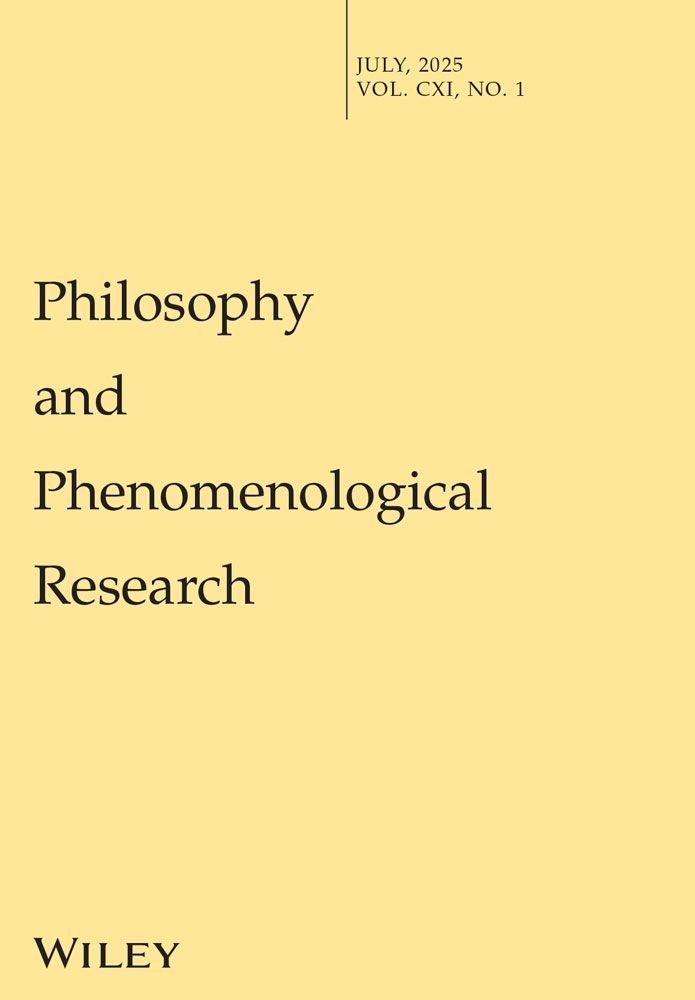
Such a readable and fascinating argument by @jessiemunton.bsky.social of @cambridgephilos.bsky.social To see a visual object is to see how it could be, not just how it is. #openaccess #philsky
26.07.2025 09:01 — 👍 108 🔁 25 💬 7 📌 2Welcome!
24.07.2025 21:11 — 👍 2 🔁 0 💬 0 📌 0Two permanent Lecturer posts at Birkbeck (equivalent of Assistant Professor). Area of specialisation is open but with teaching needs in ethics & phil of AI, ethics and poli phil, ancient, gender, continental, engaged. Closing date August 28th, start in Jan 2026 'a significant advantage' #philsky
17.07.2025 09:13 — 👍 49 🔁 51 💬 1 📌 3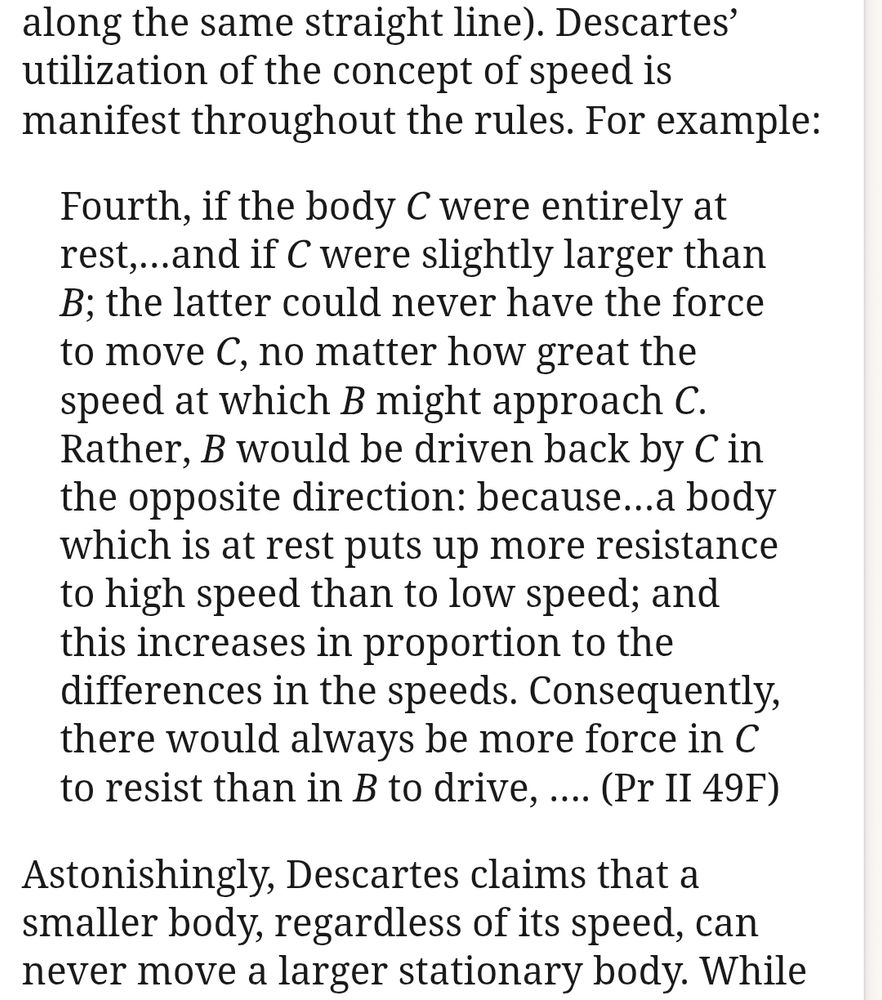
A statement of Descartes' fourth rule of motion, which states that a smaller body can never move a stationary larger body, no matter its speed
Tell me you've never cared for a toddler without telling me you've never cared for a toddler. (Descartes' fourth rule governing collisions, from Principles of Philosophy [1644].)
22.07.2025 23:01 — 👍 5 🔁 1 💬 0 📌 0
Read all Elements in The Philosophy of Biology series for FREE during the ISHPSSB conference 20 - 25 July. You can find all of these Elements free to download and read here: cup.org/4kEgivL
20.07.2025 17:16 — 👍 122 🔁 68 💬 7 📌 6
2 tenure-track Asst or Assoc professor jobs in History/Anthropology of Science, Technology & Medicine at
Carnegie Mellon U to begin in August 2026. Tech & social change or environmental & social impacts of STM; time period & geographic specialization open.
#HPS #HistSTM #STS
Deadline: Sep 15, 2025
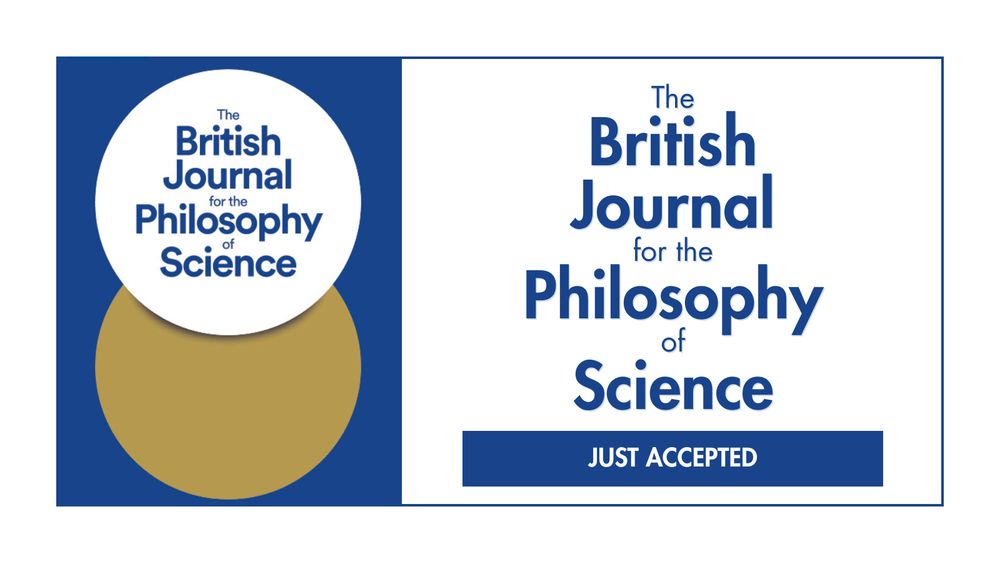
ABSTRACT In the face of today’s statistical crisis of science, it is often recommended that statistical significance tests be replaced with Bayes factor tests. In this article, I examine this recommendation. Bayes factor tests, unlike statistical significance tests, only depend on the probability of the data under H0 and a competitor H1. They are insensitive to a method’s error probabilities such as significance levels, type 1 and type 2 errors, and confidence levels. It might be thought that if a method is insensitive to error probabilities that it escapes the inferential consequences of inflated error rates at the heart of obstacles to replication. I will argue that this is not the case, and that Bayes factor tests can accord strong evidence to a claim H, even though little has been done to rule out H’s flaws. There are two reasons: their insensitivity to biasing selection effects, and the fact that H and its competitor need not exhaust the space of relevant possibilities. I will show how this results in a disconnect between Bayes factor tests and error control protocols that are being called for by replication reforms. To solve the problem, I propose that commonly used Bayes factor tests be supplemented with a post-data severity concept in the frequentist error statistical sense. The question is not whether ‘severity’ can be redefined Bayesianly—of course it can—the question is whether the resulting concept can address today’s concerns behind obstacles to replication. I will also respond to criticisms of the severity reformulation of statistical significance tests, and show how it enables avoiding fallacies of statistical tests.
Just accepted:
‘Severe Testing: Error Statistics versus Bayes Factor Tests’
– Deborah Mayo
Abstract in alt text or read the full paper here (open access): www.journals.uchicago.edu/doi/10.1086/...
#philsci #philsky


As usual, an impressively thorough, philosophically cautious, yet thought-provoking talk by Emily Sullivan as keynote and recipient of IACAP’s Herbert Simon Award.
#philsci #philtech
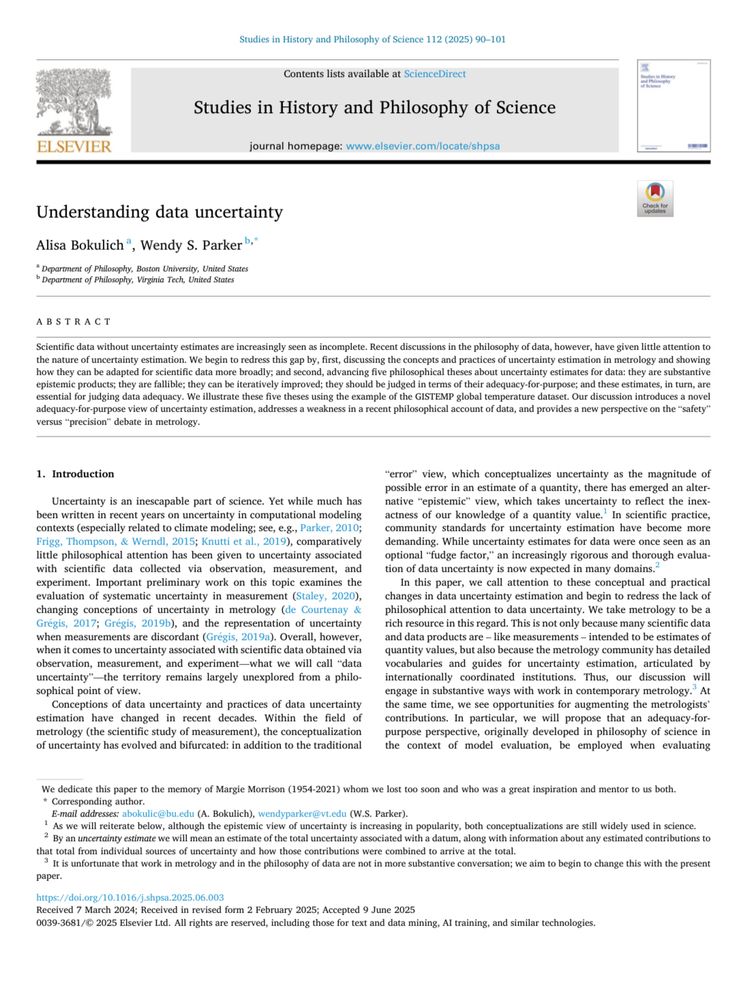
Studies in History and Philosophy of Science journal homepage: www.elsevier.com/locate/shpsa Understanding data uncertainty Alisa Bokulich", Wendy S. Parker b," " Department of Philosophy, Boston University, United States › Department of Philosophy, Virginia Tech, United States ABSTRACT Scientific data without uncertainty estimates are increasingly seen as incomplete. Recent discussions in the philosophy of data, however, have given little attention to the nature of uncertainty estimation. We begin to redress this gap by, first, discussing the concepts and practices of uncertainty estimation in metrology and showing how they can be adapted for scientific data more broadly; and second, advancing five philosophical theses about uncertainty estimates for data: they are substantive adequacy-for-purpose view of uncertainty estimation, addresses a weakness in a recent philosophical account of data, and provides a new perspective on the "safety" versus "precision" debate in metrology. 1. Introduction Uncertainty is an inescapable part of science. Yet while much has been written in recent years on uncertainty in computational modeling contexts (especially related to climate modeling; see, e.g., Parker, 2010; Frigg, Thompson, & Werndl, 2015; Knutti et al., 2019), comparatively little philosophical attention has been given to uncertainty associated with scientific data collected via observation, measurement, and experiment. Important preliminary work on this topic examines the evaluation of systematic uncertainty in measurement (Staley, 2020), changing conceptions of uncertainty in metrology (de Courtenay & Grégis, 2017; Grégis, 2019b), and the representation of uncertainty when measurements are discordant (Grégis, 2019a). Overall, however, when it comes to uncertainty associated with scientific data obtained via observation, measurement, and experiment—what we will call "data uncertainty"-the territory remains largely unexplored from a philosophical point of view. Conception…
⏰ Free access to read & download thru August 20 the final published version of Wendy Parker & my paper "Understanding Data Uncertainty" at this link ⬇️
authors.elsevier.com/c/1lMUI8yuR6...
#philsci #metasci 🧪 ⚒️
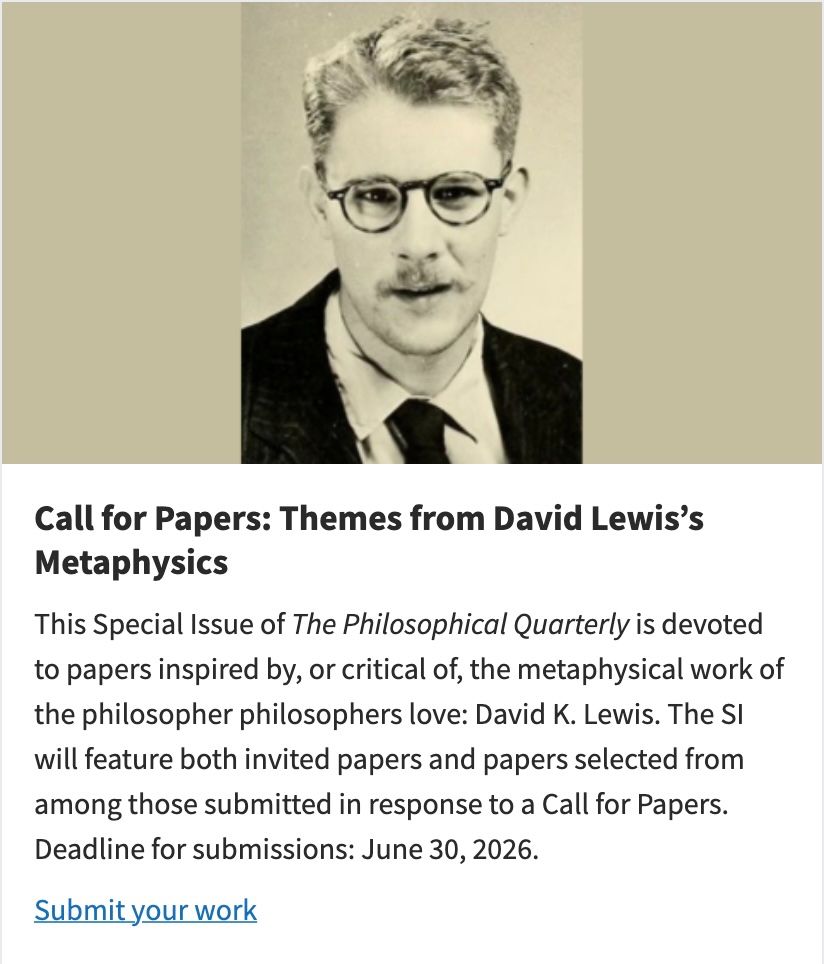
Spread the word! The Philosophical Quarterly is celebrating the philosopher philosophers love: 'Themes from David Lewis's Metaphysics' will be our next Special Issue, call for papers here:
academic.oup.com/pq/pages/cal...
@oupphilosophy.bsky.social @standrewsphil.bsky.social
Congratulations!
01.07.2025 18:18 — 👍 1 🔁 0 💬 1 📌 0For one year only, the 8th Chapel Hill Normativity Workshop will (paradoxically) be in Montreal! Keynote by Jane Friedman plus 7 talks selected via open CFA. As usual, accepted papers eligible for special issue of Phil Studies. Submissions due Oct 15th; more info at normativity.web.unc.edu
01.07.2025 14:58 — 👍 2 🔁 3 💬 0 📌 0
A new paper shows that the “creativity” of certain AI may actually be a direct, inevitable consequence of how they are built. Webb Wright reports:
www.quantamagazine.org/researchers-...
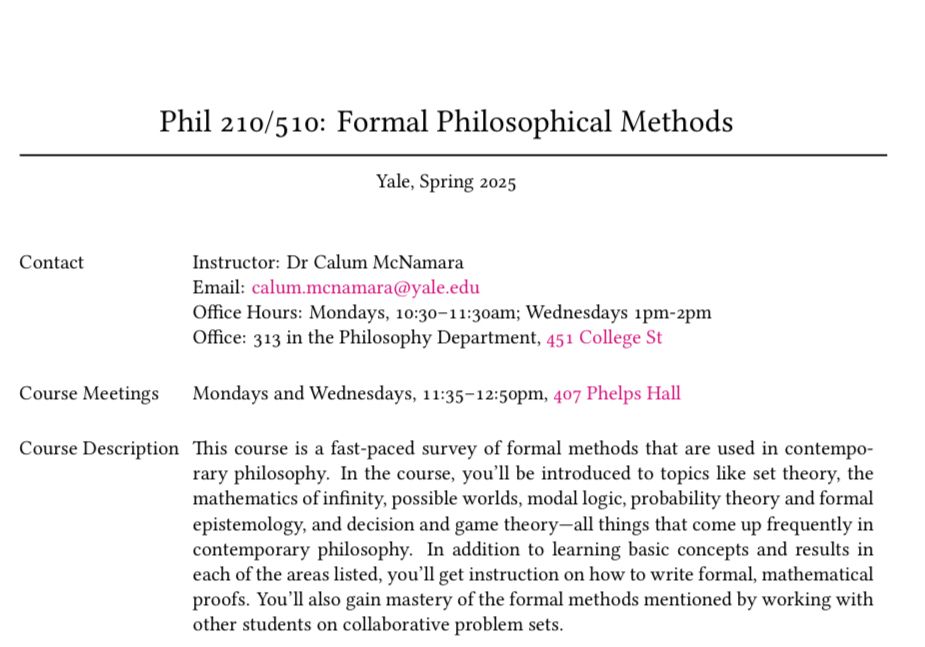
Yale Philosophy offers a course on “Formal Philosophical Methods” — a broad introduction to probability, logic, formal semantics, etc.
Instructor Calum McNamara has now made all materials for the course (78 pages) freely available
static1.squarespace.com/static/6255f...